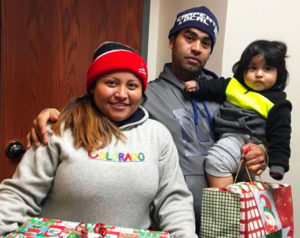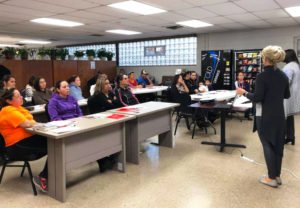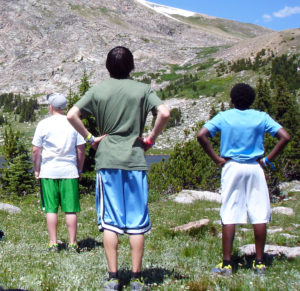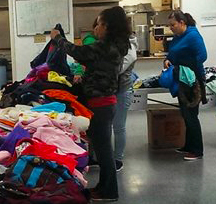CHHSM Family and Children Ministries Called to Love Neighbor, Children by Serving ‘Strangers Among Us’

Many immigrant families find help and support at CHHSM member ministries, including this family at Puentes de Esperanza.
In keeping with the United Church of Christ’s 3 Great Loves initiative, CHHSM’s child, youth and family service ministries often are on the front lines in providing support and care to migrant and immigrant persons. While challenges such as language and cultural barriers are unique, CHHSM members are finding that many of the needs immigrant and migrant families face are similar to those of any family seeking services.
Puentes de Esperanza (Bridges of Hope), part of Hoyleton Youth and Family Services in Fairview Heights, Ill., normally serves 350 immigrant and migrant persons each year, but this year, that number is up.
“Puentes de Esperanza has served 435 unique clients in this fiscal year,” says Kristen Shinn, director of community support services. Puentes clients benefit from the center’s Immigrant Family Resource Program, bilingual counseling, community support services, Latinx services, and interpretation and translation services, among others.
“Puentes’ programs assist families as they navigate complex U.S. systems, such as healthcare, public benefits, and immigration,” Shinn says. “Our programs assist eligible families to access public benefits, and connect individuals to services to improve their lives. Additionally, we have contracts with medical facilities and other community organizations to provide interpretation and translation services in Spanish.”
Immigrant families’ needs, however, are similar to other families: parents face the same struggles of parenthood, supporting their families, financial hardships, and every other ‘normal’ issue, says Shinn. “Family values are similar as well. Our Puentes families seek a better life for their children, and work hard to help their children succeed.”
BettyBeth F. Johns, community development manager for United Church Outreach Ministry (UCOM) in Wyoming, Mich., agrees.
“Our best ‘guesstimate’ is that approximately 25 percent of our clients are migrant or immigrant neighbors,” she says, which amounts to approximately 2,000 people. “In most ways, serving migrant and immigrant families is identical to serving [other] families. Our first priority is to provide a welcoming, inclusive space for ALL to access hope and help.”
Opening Up Access to Services

Among the many services offered by Puentes de Esperanza are workshops for immigrant families, like this one in the local library.
At both Puentes de Esperanza and UCOM, language and cultural barriers often are the largest obstacles to children and families receiving the support they need.
“Many of our families are limited English speaking, and our advocates help bridge that gap,” says Shinn.
For example, having an interpreter helps families get the medical care a member might need. Without that service, Shinn says, a family might have to rely on “a child to explain to a parent that he or she has a serious condition … This can be extremely stressful for both the child and parent.”
The language barrier also causes stress and insecurity about immigration status, as the lack of English skills can cause families to fall victim to immigration scams and/or extend the immigration process, Shinn adds.
At UCOM, says Johns, initial interaction with migrant and immigrant clients presents some unusual language and cultural situations.
“It is important for us to not make assumptions about whether a client understands what we are offering,” she says. “Many times, the client has an agreeable and complacent nature, responding affirmatively to our questions. Later, after we determine that interpretation is desired, we learn that very little was understood at the initial intake, and we need to start over.”
Being respectful of cultural norms different from U.S. norms also is important, Johns adds. In some cultures, for example, avoiding direct eye contact is a sign of respect. In others, women do not speak if their husband is present. “Simply training staff to ask, ‘Is it okay if I …’ before directing a question may be all that’s needed,” she says, “but it’s important to understand the culture of the client.”
Children and Youth Services Have Similar and Unique Needs

Immigrant youth at Charles Hall Youth Services experience the same programs as other youth, including outdoor adventure activities in the Badlands.
CHHSM ministries specializing in serving children and youth find that despite cultural differences, many of the problems young people face are similar. At Charles Hall Youth Services in Bismarck, N.D., Tomi Cimarosti, director of residential services, says that trauma-informed care and therapy are the same, no matter where a youth comes from.
Charles Hall has a long history of aiding Native American youth who have experienced a kind of trauma and discontent similar to many immigrant youth.
“The situations and unique traumatic circumstances and challenges will be different; however, the approach to ensuring the [immigrant] youth have access to the same treatment providers that the rest of our youth get is non-negotiable,” says Cimarosti. Regardless of where they are from, “most children who come to us come from difficult circumstances, struggle with similar poverty issues, and similar abuses.”
Helping immigrant youth obtain opportunities for education, employment and worship can be particular challenges for the staff of Charles Hall. Such seemingly simple things as knowing every address a youth has lived at to verify work qualifications — or grade level completed to ascertain educational level — can be problematic, says Cimarosti, as many youth do not come from a structured living environment, or information on their paperwork may be incorrect. Additionally, many North Dakota communities do not have mosques or synagogues, making it difficult to locate a place of worship for immigrant youth.
At Hoyleton, Shinn sees cultural dissonance and the ever-present fear of losing one’s parents as special challenges for immigrant youth.
“Many of the youth we serve are caught between two cultures, that in the U.S. which they have grown up in, and that in their household, which is based on their parents’ origin,” she says. “Our youth are extremely resilient, despite the hardships their families face. Families that are separated due to deportation may be apart for years before they can be reunited or even visit with each other. For families where a parent may not have papers, they live in a constant state of fear of deportation. This fear is apparent in young children we work with, who wonder at times if their parent will be home when they return from school.”
Finding a Sense of Identity
Franklinton Center at Bricks in Whitakers, N.C., sees a different challenge with the area’s migrant children. The center participates in a Summer Migrant Education Program, a federal program run by the local school system. It conducts historic walking tours in English and Spanish, and also facilitates dialogue with Latinx students to highlight “the importance of remembering where we come from as we step into the wider world around us,” says Vivian Lucas, executive director.
“Many of these students feel that North Carolina is their home, but they live with the discomfort of political chaos caused by the uncertain immigration policies related to the particular stories of their families,” Lucas says. “The students note that while this federal and state initiative is named, ‘Migrant Education Program,’ most were born in North Carolina and have lived in the state their entire lives.”
The name of the program is based on a structure that has not caught up with the reality that many migrants stay and maintain households and families, Lucas adds.
Work Together for All God’s Children

Even simple things like this clothing drive at Puentes can be of immense help to struggling immigrant families.
The CHHSM ministries working with immigrant and migrant children and families find that two ingredients are key in providing the support the families need.
“Listen to the stories of the immigrant families and individuals themselves and respond appropriately to each unique situation,” says Bruce Roller, executive director of UCOM. Also, “collaborate … with other agencies that are working with and on behalf of immigrants.”
Hoyleton’s Shinn adds, “it is important to have some knowledge and understanding of what the families are facing. Educating team members about the immigrant community around you is important. This includes being aware of immigrant providers in the area.”
The UCC’s servant leadership-based ministries live out their call of love of children and love of neighbor each day. CHHSM’s child, youth, and family service members have a unique role to play in helping immigrant and migrant families negotiate successful outcomes in the United States, says Charles Hall’s Cimarosti. Her advice is simple:
“Continue to serve with God’s love and reach out to your local community to help sift through the challenges that our families are facing,” she says. “Be empathetic to where they are coming from. Don’t take their anger personally, as they have been through a lot.
“Lastly, be open to learning about their ways, customs, and beliefs. Help them to lead where they want to go, and guide that as much as possible, with God’s love.”
Join Our Mailing LIst
"*" indicates required fields
Follow on Facebook
New Resident Finds Belonging at Emmaus Homes - CHHSM
www.chhsm.org
Heather’s journey toward independence has been nothing short of inspiring. Since moving into her new home last year, Heather’s world has expanded in ways she never imagined. Leaving the familiarit...